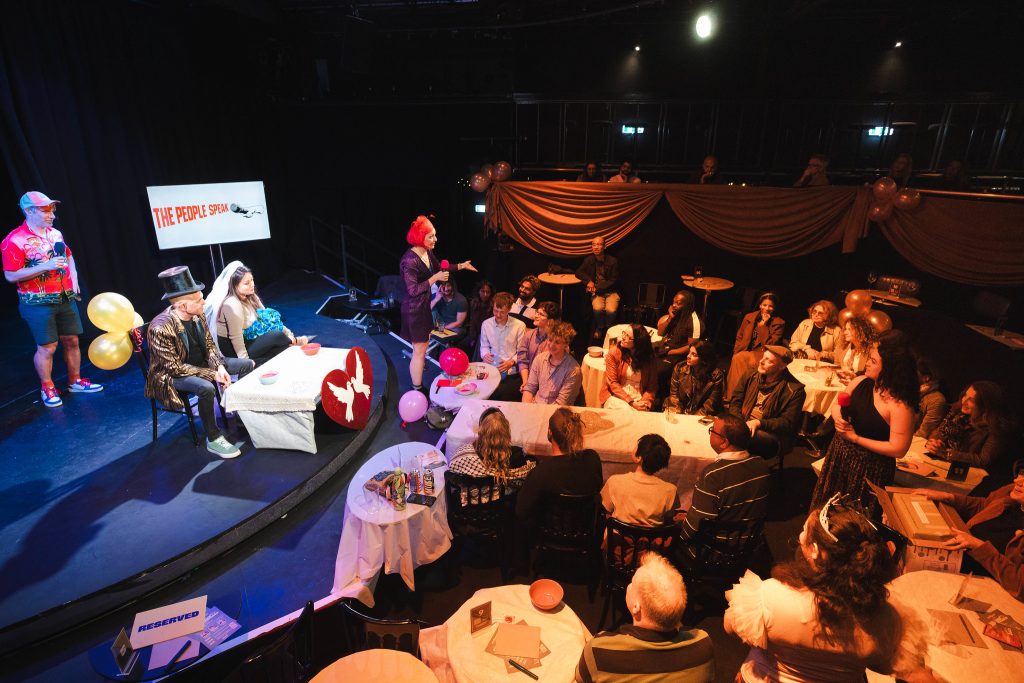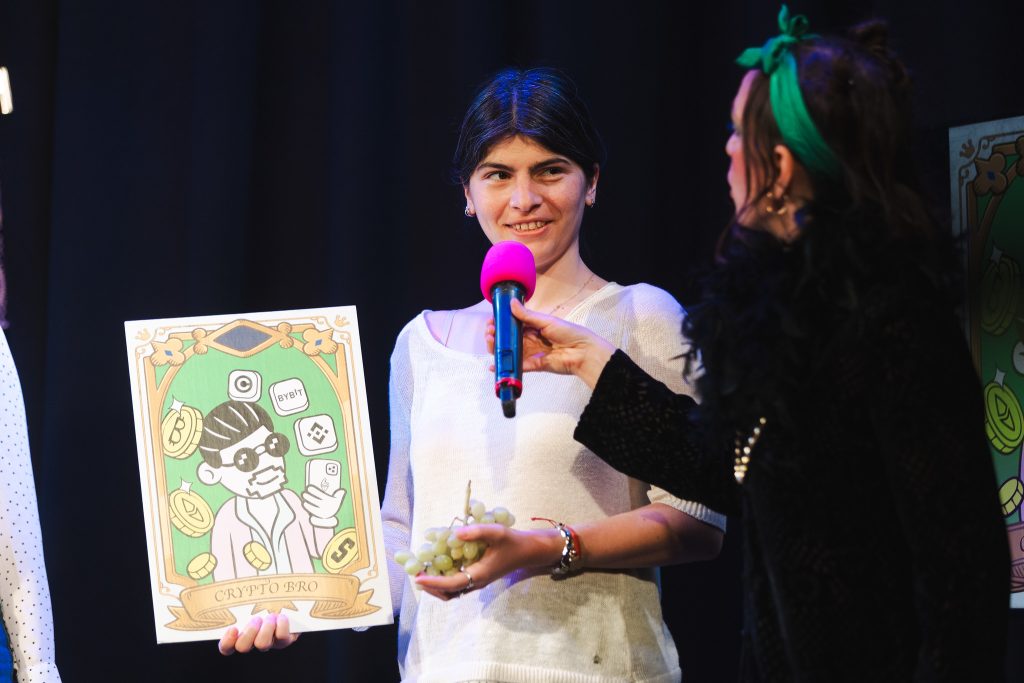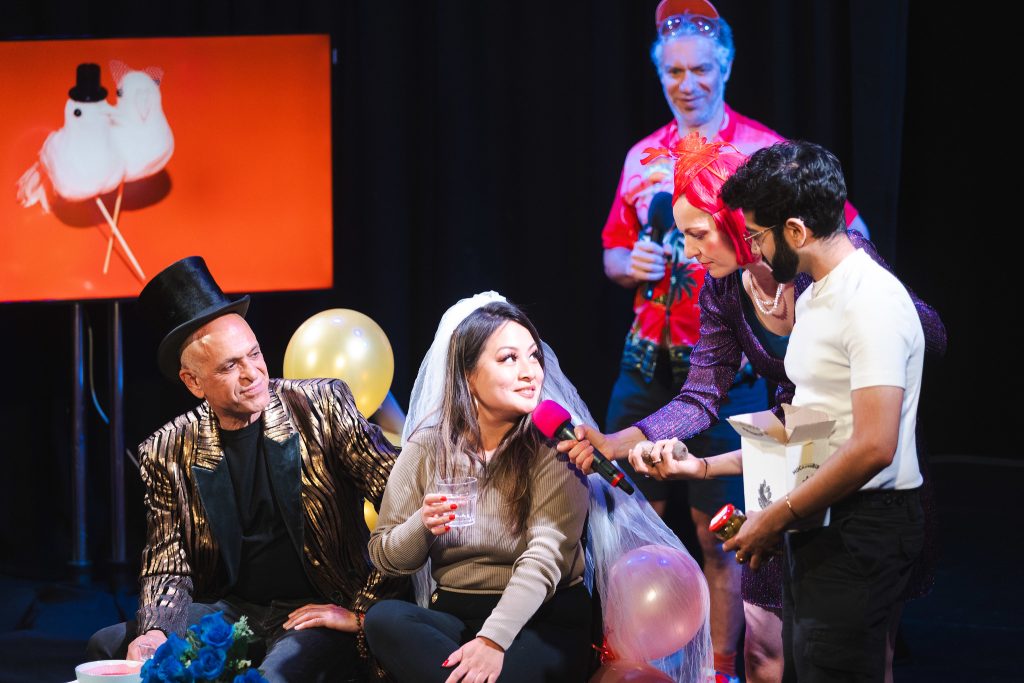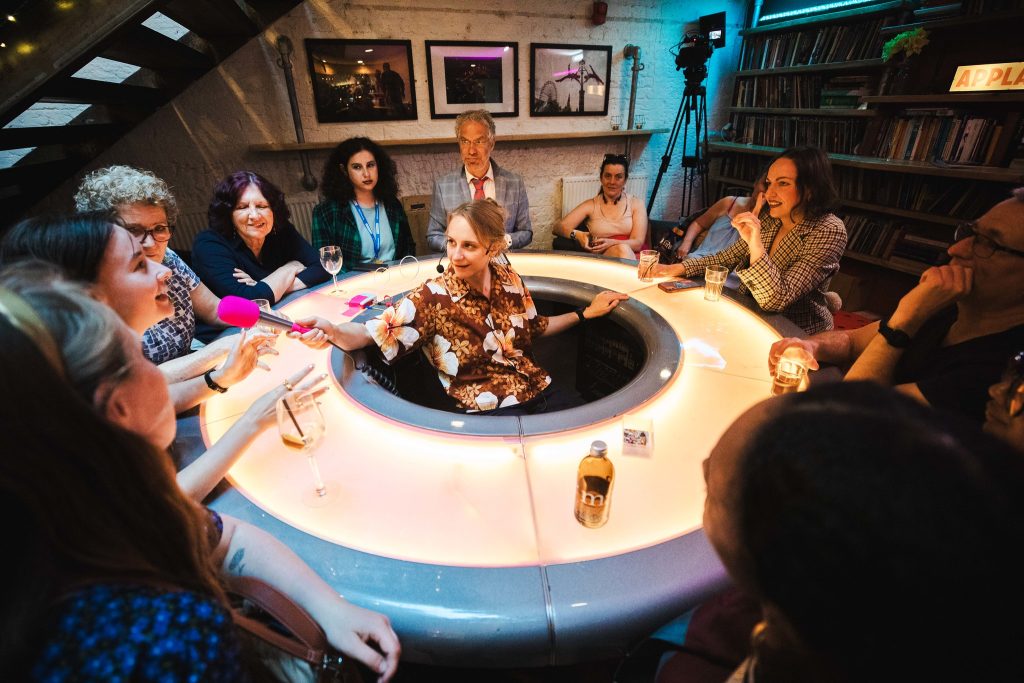“More ways to skin a cat”: Quacktion Time, The Wedding and Heal the Net – New participatory formats at The Pleasance Theatre
At The People Speak we have many strings to our bow. In May 2025 we had the opportunity to create brand new participatory structures at the Pleasance Theatre for The Critical Conversations series commissioned by Sage and Jester production company. The aim was to involve the audience in discussing misinformation, truth and build dialogue around different perspectives. We followed our principles of creating participatory performance:
- Non-hierarchy: facilitators and participants are all equals
- Structure without content: the content is developed spontaneously by the participants using an accessible structure
- Co-creation: it is about creating performance collectively
‘Quacktion time’: using satire as a way to shed light on the truth (13 May)
We recreated the format of the talk show Question Time, with a twist! We called it Quacktion time and had participants in the audience wearing animal masks. They could channel their inner political animal and discussed serious quacktions concerning the general welfare of the burrows of London, represented by six animal panelists. Through a series of provo-cat-ions, the animals got caught in the game and discussed topics such as: which animal would be the best ruler? The duck argued that due to their ability to be on the ground, the water and in the sky, they could offer different perspectives of the world. The elephant (in the room…) claimed that it was their God-given duty to be the ruler, implying their superiority in the kingdom. The lamb explained that they occupied the moral high ground due to their sacrificial position. We invited the animals to be daring and to disrupt the expected direction of the conversation rather than focus on the dynamic of exchanging facts and demonstrating knowledge on the subject that happens on television discussion programmes. Pushing them to have provocative ideas and answers is part of The People Speak’s mentality as it’s about challenging different world views.
‘The Wedding’ – Polish wedding games for star crossed lovers: tackling the most divisive topics to become better conversationalists (19 May)
Set around a meandering table covered with white cloth, two families from different backgrounds met for a Polish wedding, where they were encouraged to get to know other family members through wedding games. Uncle Przemysław, knowing that he would miss the wedding, sent a parcel with provocative content. While playing pass the parcel, the two families discussed and confronted each other about the sensitive assertions made by our dodgy but well meaning uncle. ‘Birds aren’t real’, asserted one of the guests, but we challenged them to deal with the strong differences of opinions by seeking consensus in the name of uniting the two families together. We shared some clichéd platitudes about love and togetherness as a way to potentially soothe any deeper conflict. Platitudes, even if they are cliché, also have a universal and straightforward significance and it was interesting to see the wedding party engage with these shared truths that didn’t come from academic knowledge.
“I had my doubts that the experience would work at first to be honest, as it seemed a bit random. So I was taken aback to find just how absolutely successful it was! I had tremendous fun participating. I felt that everybody there, as the event drew on, really got into the swing. The show culminated in a way that suggested, underneath the dressing, it was ‘going somewhere’. If it was a little haphazard, even chaotic (in a good way), the organisation and ‘narrative logic’ emerged through everything as the event wore on. You had to be there” – The Wedding participant
‘Heal the Net’: questioning the balance between free speech and censorship through the notion of algorithms (20 May)
“The fun and creative approach added a new spiritual vibe to algorithms. It made me view algorithms as an ever-present ghost that is haunting our everyday life. And, this is coming from someone who doesn’t even believe in ghosts!“ – Heal the Net participant
That night, the internet was dead and we had to revive it (spoiler alert: we did!)! Led by Sister Margarita and Brother Read-the-Room, the brothers and sisters cleansed the room through ritualistic chants. Rather than using western-style appraoch to medicine, we decided to try alternative holistic techniques. We did a psychic reading of the internet with customised Taroblox cards. This set of cards represented the archetypes that we see every day on social media platforms, such as the ‘get ready with me’. Seance participants were invited to pick a Taroblox card and physically embrace the spirit of it using an evocative object (dumbells for the Gym Bunny, broccoli for the Paleo Diet Influencer etc.). As the reading progressed, participants personalised and critiqued the archetypes, by projecting their own online experience, opening doors for wider conversation about the climate, mental health, spirituality, cost of productivity and many more . That could be very different from the algorithmic archetype that they picked. A culture of over-productivity and definitions of success were invoked. One of our roles was the creative linking of ideas and it was necessary for us to focus on the trajectory and insights rather than on getting immediate results. Healing the internet with alternative medicine meant taking a longer, more laborious route and perhaps a more rewarding one.
“Taking part in the show definitely evolved my perspective on social media influence and how we’re targeted by algorithms. Also how opinions are formed, digested, and repeated by its consumers. Whilst disconnecting or minimising our footstep seems to be a solution but implementing such solutions is not as easy as it is often believed. The fun and creative approach added a new spiritual vibe to algorithms” – Heal the Net participants
Creating participation structures in the age of social media
One of our many observations about social media is that it aims to provide sharp, short and engaging content that is designed to provoke an instant emotional response. Counter to that, our formats invite tangential exploration of the subjects through intellectual and physical engagement. The punchline or the final conclusion is often deferred and completed by the other participant later on.
Changing perspectives is a process. Our formats are mostly concerned with planting the seed and creating conditions for this to begin.
That said, the translation of loose impressions and thoughts from the audience members into concrete links with the themes of the event had to happen much faster and more directly, which was challenging for the facilitators but also a great exercise in concision and synthesis of different perspectives.
“I learned that things can work out even when you think they’re not going to. So it taught me to have more belief, and be less negative and dismissive. It also taught me, as the old adage says, that there are more ways to skin a cat than one, to think laterally. There are ways of doing and going about things and finding solutions as yet undreamt of in my philosophy” – The Wedding participant
Documentation
13 May 2025
‘Quacktion Time’ photos and video
Talkaoke at Tricks, Trolls and Lols video
19 May 2025
‘The Wedding’ photos and video
Talkaoke at Truth Hurts video
20 May 2025
‘Heal the Net’ photos and video
Talkaoke at How to Cure Your Algorithm video
The creative team behind the formats
Mikey Weinkove, Margot Przymierska, Helena Bloch, Pamela Farrugia, Christopher Gerhard and Jo Elise












